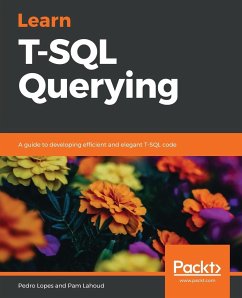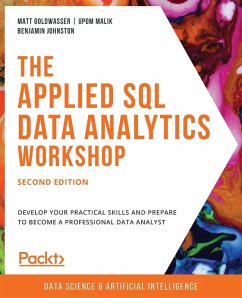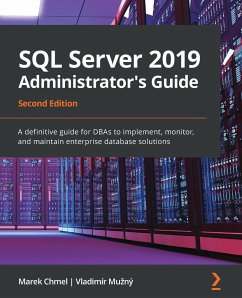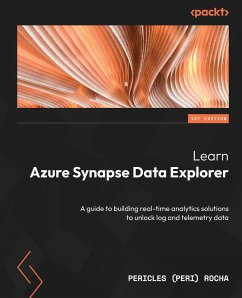
Learn T-SQL Querying - Second Edition
A guide to developing efficient and elegant T-SQL code
Versandkostenfrei!
Versandfertig in 1-2 Wochen
35,99 €
inkl. MwSt.

PAYBACK Punkte
18 °P sammeln!
Troubleshoot query performance issues, identify anti-patterns in your code, and write efficient T-SQL queries with this guide for T-SQL developers Key Features: - A definitive guide to mastering the techniques of writing efficient T-SQL code - Learn query optimization fundamentals, query analysis, and how query structure impacts performance - Discover insightful solutions to detect, analyze, and tune query performance issues - Purchase of the print or Kindle book includes a free PDF eBook Book Description: Data professionals seeking to excel in Transact-SQL for Microsoft SQL Server and Azure S...
Troubleshoot query performance issues, identify anti-patterns in your code, and write efficient T-SQL queries with this guide for T-SQL developers Key Features: - A definitive guide to mastering the techniques of writing efficient T-SQL code - Learn query optimization fundamentals, query analysis, and how query structure impacts performance - Discover insightful solutions to detect, analyze, and tune query performance issues - Purchase of the print or Kindle book includes a free PDF eBook Book Description: Data professionals seeking to excel in Transact-SQL for Microsoft SQL Server and Azure SQL Database often lack comprehensive resources. Learn T-SQL Querying second edition focuses on indexing queries and crafting elegant T-SQL code enabling data professionals gain mastery in modern SQL Server versions (2022) and Azure SQL Database. The book covers new topics like logical statement processing flow, data access using indexes, and best practices for tuning T-SQL queries. Starting with query processing fundamentals, the book lays a foundation for writing performant T-SQL queries. You'll explore the mechanics of the Query Optimizer and Query Execution Plans, learning to analyze execution plans for insights into current performance and scalability. Using dynamic management views (DMVs) and dynamic management functions (DMFs), you'll build diagnostic queries. The book covers indexing and delves into SQL Server's built-in tools to expedite resolution of T-SQL query performance and scalability issues. Hands-on examples will guide you to avoid UDF pitfalls and understand features like predicate SARGability, Query Store, and Query Tuning Assistant. By the end of this book, you'll have developed the ability to identify query performance bottlenecks, recognize anti-patterns, and avoid pitfalls What You Will Learn: - Identify opportunities to write well-formed T-SQL statements - Familiarize yourself with the Cardinality Estimator for query optimization - Create efficient indexes for your existing workloads - Implement best practices for T-SQL querying - Explore Query Execution Dynamic Management Views - Utilize the latest performance optimization features in SQL Server 2017, 2019, and 2022 - Safeguard query performance during upgrades to newer versions of SQL Server Who this book is for: This book is for database administrators, database developers, data analysts, data scientists and T-SQL practitioners who want to master the art of writing efficient T-SQL code and troubleshooting query performance issues through practical examples. A basic understanding of T-SQL syntax, writing queries in SQL Server, and using the SQL Server Management Studio tool will be helpful to get started. Table of Contents - Understanding Query Processing - Mechanics of the Query Optimizer - Exploring Query Execution Plans - Indexing for T-SQL Performance - Writing Elegant T-SQL Queries - Discovering T-SQL Anti-patterns in Depth - Building diagnostic queries using DMVs and DMFs - Building XEvent profiler traces - Comparative analysis of Query Plans - Tracking performance history with Query Store - Troubleshooting Live Queries - Managing optimizer changes with the Query Tuning Assistant














